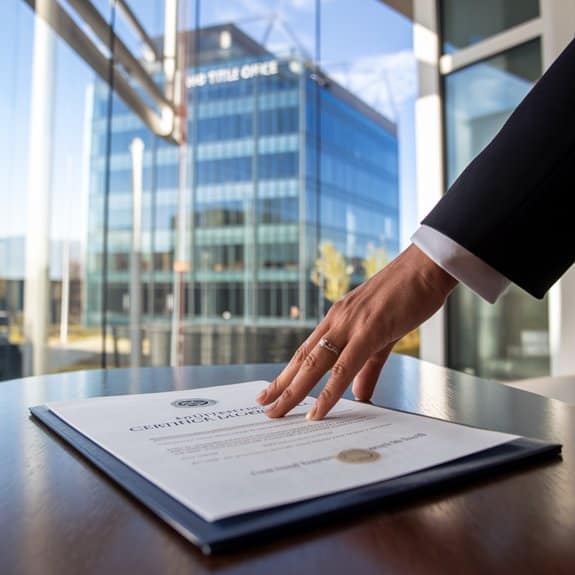
You would file a Certificate of Pending Litigation (CPL) in BC to protect your interest in real property during legal disputes. This legal tool prevents the property owner from selling or encumbering the land while the litigation progresses, ensuring the property remains available if your claim succeeds. It is appropriate when you are asserting ownership interest or specific performance in a purchase agreement, not for monetary leverage. The following details will guide you through proper CPL implementation.
Legal Definition and Purpose of a Certificate of Pending Litigation
A Certificate of Pending Litigation (CPL) serves as a powerful legal instrument in British Columbia’s property law system.
It is a document registered against a property’s title to notify the public that there is an ongoing legal dispute concerning an interest in that land. When properly filed under Section 215 of the Land Title Act, a CPL effectively “freezes” the property title, preventing sales, mortgages, or other encumbrances without the claimant’s consent.
You can register a CPL if you are involved in litigation claiming a legitimate interest in land—not merely for financial leverage.
For instance, as a purchaser facing a seller who cannot complete a transaction, you would have grounds for a CPL. This protection guarantees that if you win your case, the property remains available to satisfy the judgment.
Protecting Your Interest in Real Property During Litigation
When litigation involves a claim to real property in British Columbia, protecting your interest requires strategic action beyond merely filing a lawsuit.
A Certificate of Pending Litigation (CPL) serves as your legal safeguard, effectively freezing the property’s title until your dispute is resolved.
By registering a CPL, you will prevent the owner from selling, mortgaging, or transferring the property while your claim proceeds through court.
This protection is essential when you are asserting an ownership interest, seeking specific performance of a purchase agreement, or claiming a right to the land itself.
Requirements for Filing a Valid CPL in British Columbia
Filing a valid Certificate of Pending Litigation in British Columbia requires meeting specific legal criteria established under Section 215(1) of the Land Title Act. You must demonstrate a genuine claim to an interest in the land itself, not merely a monetary claim related to the property.
| Requirement | Consequence if Not Met |
|---|---|
| Must claim legal/equitable interest in land | CPL will be struck down by court |
| Claim must be consistent with interest in land | Damages to property owner possible |
| Cannot be used as leverage for monetary disputes | Court may order costs against you |
Your CPL application must be electronically filed by a legal professional who can verify your claim meets these requirements. Remember that misusing a CPL as a bargaining tool can result in negative legal consequences and reputational damage.
Common Scenarios When a CPL Is Appropriate
Legitimate scenarios for registering a Certificate of Pending Litigation typically involve disputes where you are asserting a direct interest in real property rather than merely seeking monetary compensation.
You might appropriately file a CPL when you are a purchaser whose real estate transaction has not completed due to the seller’s default, or when you have contributed to a property purchase but your name is not on title.
CPLs are also justified in constructive trust claims, where property was purchased with misappropriated funds, or in partnership disputes involving shared real estate assets.
Remember that courts will scrutinize your claim carefully. Your litigation must genuinely seek an interest in the specific land—not just use the CPL as leverage for financial settlement.
Misuse can lead to cancellation and possible damages.
Limitations and Restrictions on Using a CPL
Despite their usefulness in protecting property interests during litigation, Certificates of Pending Litigation come with significant limitations that you must understand before filing.
A CPL is not a tool for pressuring settlements or gaining leverage in purely monetary disputes. Courts consistently reject CPLs used as bargaining chips rather than to preserve legitimate land interests.
You cannot register a CPL unless you are claiming a genuine legal or equitable interest in the land itself. As demonstrated in the RStyle Enterprises case, courts will remove CPLs when claims are inconsistent with land interests.
If you are seeking financial compensation rather than specific performance, a CPL is not appropriate.
Remember that improper use can prevent legitimate property transactions and may result in legal repercussions and reputational damage for you as the filer.
The Process of Registering a CPL With the Land Title Office
The actual registration of a Certificate of Pending Litigation requires careful attention to proper procedure and legal requirements.
Registering a Certificate of Pending Litigation demands strict adherence to procedural protocol and statutory requirements.
You will need a legal professional’s assistance, as CPLs must be electronically signed by a lawyer or notary before filing.
To register a CPL, you must have a valid claim asserting an interest in the land or a right of action regarding the property.
Your application must comply with Section 215 of the Land Title Act. The document will be filed electronically with the Land Title and Survey Authority.
While you might be tempted to handle this yourself, the time-sensitive nature and technical requirements make professional assistance essential.
Your lawyer can also investigate the current title status and identify potential issues before submission.
Consequences of Filing an Improper or Unjustified CPL
Filing a CPL without legitimate grounds can lead to serious legal and financial consequences. Courts take a dim view of improper CPLs used merely as bargaining tools in monetary disputes rather than to protect genuine land interests.
If you file an unjustified CPL, you may face liability for damages suffered by the property owner, including lost sale opportunities and decreased property value. The court can order immediate removal of your CPL and award costs against you.
As demonstrated in the RStyle Enterprises case, a claim inconsistent with an interest in land will likely result in CPL removal.
Additionally, improper CPL filings can damage your professional reputation and credibility in future legal proceedings. Courts may also impose sanctions for what they consider an abuse of process.
How Vest Estate Law Can Help
Maneuvering Certificate of Pending Litigation matters requires specialized knowledge that Vest Estate Law‘s team possesses in abundance.
As a boutique firm dedicated exclusively to estate law across Alberta and BC, we recognize the nuances of when and how to effectively use CPLs to protect your interests in land.
Our lawyers can determine if your case genuinely warrants a CPL filing, prepare and electronically submit the necessary documentation, and represent you if challenges arise.
Navigating CPL filings requires expert evaluation, meticulous preparation, and strong representation—precisely what our estate specialists deliver.
We will guarantee your CPL is used as a legitimate protective measure rather than an improper bargaining tool.
If you are facing a situation where property interests are at stake during litigation, do not navigate these complex waters alone.
Work with Vest Estate Law, where our focused expertise in estate matters can make all the difference.
Frequently Asked Questions
How Long Does a Certificate of Pending Litigation Typically Remain on Title?
A CPL remains on title until your litigation concludes, the court orders its removal, or after one year of inactivity. You will need a court order to cancel it otherwise.
Can a CPL Be Registered Against Only a Portion of Land?
Yes, you can register a CPL against a portion of land if your claim specifically relates to that section. You will need to clearly define the boundaries in your application.
What Are the Costs Associated With Filing a CPL?
You will pay legal fees for your lawyer’s services, court filing costs, and Land Title registration fees (approximately $86-$90). Additional costs may include potential liability for damages if improperly filed.
Can a Defendant File a CPL Against a Plaintiff’s Property?
Yes, you can file a CPL against a plaintiff’s property if you are a defendant with a valid counterclaim asserting an interest in their land through your litigation.
How Quickly Can a CPL Be Removed Once Litigation Concludes?
Once your litigation concludes, you can have a CPL removed immediately through a court order or your lawyer filing the necessary documents with the Land Title Office.

We serve the entire province of BC. Our experienced paralegals can meet with you in Vancouver and throughout the Lower Mainland, making it easier for you to get the assistance that you need. We also have an interior office in Kamloops. That said, our lawyers have the infrastructure to work with any of our clients virtually — even in the furthest regions of British Columbia.
Call (604) 256-7152 [toll free 1 (877) 415-1484] to get routed to the best representative to serve you or contact us online to schedule an appointment.
We also have a dedicated intake form to help you get the ball rolling. Our intake team will review your specific case and advise you on the next steps to take and what to expect moving forward.
Our offices are generally open 8:30 a.m.—5:00 p.m., Mon—Fri.
Vest Estate Law is dedicated to providing you with practical and innovative advice in estate administration, estate planning, and estate disputes, do not hesitate to reach out and one of our knowledgeable staff will respond promptly to arrange a consultation that meets your needs.


Nathaniel Mcghie
WILLS and ESTATES LAWYER
Nathaniel Mcghie is a lawyer in our Vancouver office. Nathaniel is experienced in representing clients and providing legal advice on estate law matters. He is sought after by both individuals and corporations for legal representation.

